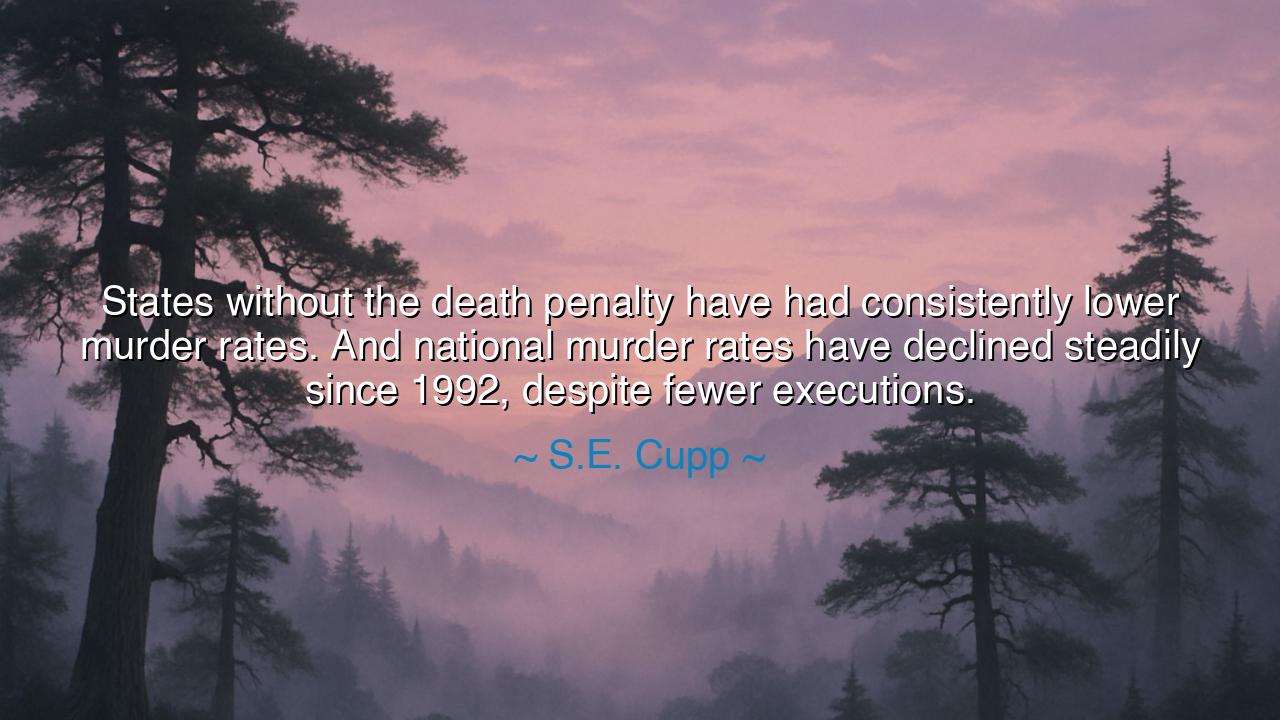
States without the death penalty have had consistently lower
States without the death penalty have had consistently lower murder rates. And national murder rates have declined steadily since 1992, despite fewer executions.






"States without the death penalty have had consistently lower murder rates. And national murder rates have declined steadily since 1992, despite fewer executions." — so spoke S.E. Cupp, a voice of reason amid the thunder of vengeance and fear. Her words cut through the darkness of old assumptions, shining a light on one of humanity’s most enduring dilemmas — the belief that violence can be cured by more violence. In this statement lies a truth that humbles the proud and challenges the ancient instinct for retribution: that peace is not born of punishment, but of understanding; that justice is not perfected by death, but by wisdom.
The meaning of this quote reaches beyond mere statistics. It is not only an observation about crime and law; it is a meditation on the human heart. Cupp reminds us that despite the clamor for harsh justice, the evidence speaks softly but firmly: mercy and restraint serve life better than cruelty and fear. When she says that states without the death penalty have lower murder rates, she is not merely comparing numbers — she is revealing a truth about the soul of a nation. A people who choose not to kill, even in the name of justice, cultivate within themselves a spirit of life, and that spirit ripples outward into society, calming the very violence it seeks to end.
To understand this, we must look into history. For centuries, rulers have believed that fear is the greatest deterrent — that to strike terror into the hearts of wrongdoers is to preserve order. Yet time and again, this has proven false. Consider the reign of Emperor Ashoka of India, once known as “Ashoka the Cruel.” After waging a war so bloody that its rivers ran red, he looked upon the corpses of the fallen and felt the weight of his sin. In that moment of awakening, he renounced conquest by the sword and turned to the path of compassion. Under his rule, violence declined, learning flourished, and the empire prospered. Where once there was blood, there was now wisdom. Ashoka learned, as Cupp reminds us, that it is not execution but enlightenment that tames the savage heart.
The origin of S.E. Cupp’s insight lies not in theory, but in the modern reality of America’s justice system. For decades, supporters of the death penalty claimed it as a necessary shield against evil — a way to preserve order and avenge the innocent. But the evidence, clear and enduring, has spoken otherwise. From 1992 onward, as executions waned, murder rates fell across the nation. The supposed link between death sentences and safety crumbled. Instead, it became evident that communities grounded in education, compassion, and opportunity fostered peace more deeply than those ruled by fear and vengeance. The sword of the state proved less powerful than the hand that builds and forgives.
There is a deeper moral thread here — one that transcends law and enters the realm of philosophy. The death penalty promises closure but delivers emptiness. It pretends to honor life by extinguishing it. Yet every act of killing, no matter how justified by man’s laws, stirs the ancient truth: that life, once taken, cannot be restored. A society that kills to teach that killing is wrong contradicts itself, and in that contradiction lies a spiritual sickness. As Cupp’s observation shows, the nations and states that let mercy rule their justice are not weaker — they are stronger, for they have mastered the hardest lesson of all: to answer darkness not with darkness, but with light.
History offers another mirror in the life of Nelson Mandela. Imprisoned for twenty-seven years, tortured by injustice, he emerged not with hatred, but with forgiveness. Had he chosen vengeance, his nation might have drowned in blood. Instead, he led with reconciliation, and his people followed him into peace. Mandela understood, as Cupp’s words echo centuries later, that true strength lies not in retribution, but in restraint — that a people’s greatness is measured not by whom they destroy, but by whom they choose to spare.
Let this be the lesson: a civilization that honors life, even the life of the guilty, builds a foundation that endures. Do not be deceived by the false power of fear; it burns quickly and consumes all it touches. Choose, instead, the quiet power of compassion, which grows roots deep into the earth of the human soul. Speak for justice, but let your justice heal rather than harm. Seek safety, but let your safety arise from love, not terror. For as S.E. Cupp reminds us, the decline of violence follows the rise of mercy — and only when we cease to worship death will we learn to live as a people worthy of life itself.
Thus, remember this: mercy is the mightiest defense. Where compassion reigns, blood ceases to flow. And as long as humankind chooses life over death — understanding over vengeance — then, and only then, will peace cease to be a dream, and become instead our most enduring earthly establishment.






AAdministratorAdministrator
Welcome, honored guests. Please leave a comment, we will respond soon